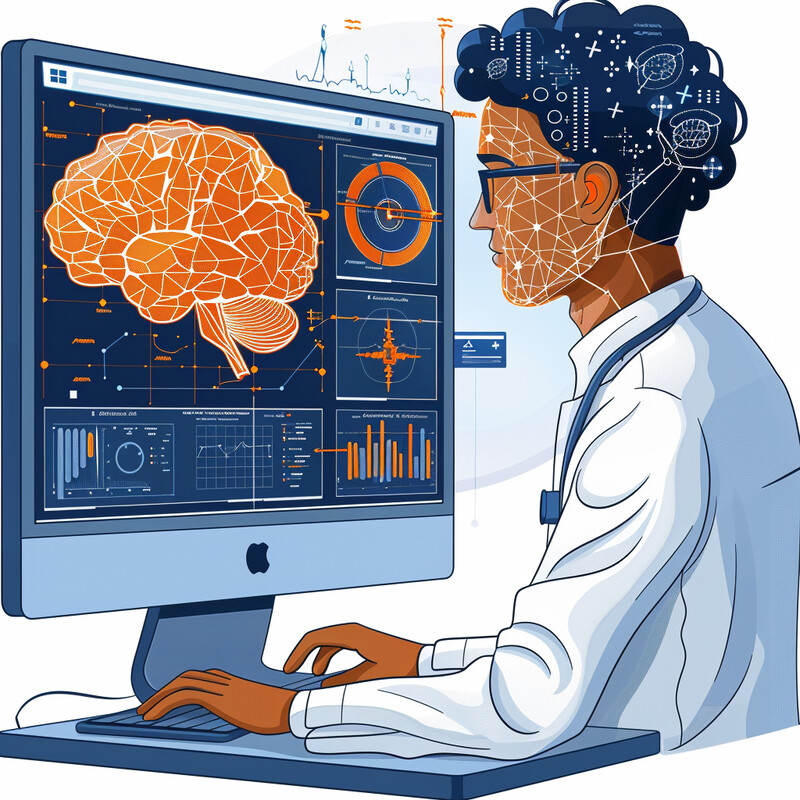1. Diagnostic Assistance
AI is transforming the diagnostic process by rapidly analyzing complex medical data and providing clinicians with accurate insights. Machine learning models, especially deep learning, can examine imaging scans (like X-rays, CTs, MRIs) and laboratory results to detect subtle patterns or anomalies that might be missed by human eyes. This means conditions such as tumors, fractures, or nodules can be identified faster and with potentially greater accuracy, reducing diagnostic errors. AI acts as a second pair of eyes for radiologists and pathologists, highlighting areas of concern (for example, an AI might outline a faint lung nodule on a chest X-ray) and thereby improving confidence in the diagnosis. By integrating patient history and cross-referencing vast medical databases, AI diagnostic tools help ensure that clinicians consider all possible diagnoses, ultimately leading to earlier detection of diseases and improved patient outcomes.

In 2023, a landmark clinical trial in Sweden (the MASAI trial) demonstrated AI’s impact in diagnostics. It showed that an AI system assisting in mammography screening could reduce radiologists’ workload by about 44% while maintaining the same cancer detection rate as traditional double reading by two radiologists. In the study of over 80,000 mammograms, the AI tool flagged which images needed closer review, allowing radiologists to focus on the most suspicious cases without missing cancers. Notably, the AI-driven workflow detected as many breast cancers as the standard method, but with far less human time, illustrating how AI can safely speed up diagnoses without sacrificing accuracy. These results underscore that AI can enhance diagnostic assistance by catching disease reliably and streamlining the process (Lång et al., 2023, Lancet Oncology).
2. Treatment Recommendations
AI provides personalized treatment recommendations by analyzing a patient’s unique data against vast medical knowledge. In practice, AI-driven systems can compare a patient’s diagnosis, genetic profile, and medical history with millions of prior cases and outcomes documented in research and electronic health records. This allows the AI to suggest therapies that have worked best for similar patients. For example, if a diabetic patient has specific co-morbidities, an AI might recommend one medication over another based on outcomes seen in comparable cases. These recommendations are often accompanied by evidence or confidence scores, helping clinicians understand the rationale. Rather than replacing physician judgment, AI acts as a smart assistant—synthesizing guidelines, clinical trial data, and case studies to ensure no treatment option is overlooked. By tailoring suggestions to the individual, AI helps optimize treatment plans for efficacy and safety on a patient-by-patient basis.

A 2025 clinical study showed that doctors can make better decisions with AI support when formulating treatment plans for patients. In the study (published in Nature Medicine), physicians were given a complex clinical scenario – such as deciding pre-surgery medication management or adjusting a protocol for a patient with past adverse drug reactions – and asked to make decisions with or without an AI chatbot’s help. The results were striking: an AI chatbot alone often outperformed doctors using only standard resources, and physicians paired with the AI performed as well as the AI itself, significantly better than doctors working solo. The AI (a large language model) was able to process nuanced patient details and medical knowledge to suggest management steps that aligned with best practices. Doctors using the AI’s suggestions made more comprehensive and correct decisions than those relying on internet searches or memory. This indicates that AI can effectively augment clinicians’ decision-making – for instance, by recalling obscure but relevant research or considering patient specifics – ultimately leading to more informed and personalized treatment recommendations.
3. Drug Interaction Alerts
AI enhances medication safety by monitoring patient prescriptions and alerting healthcare providers to potential adverse drug interactions. In a clinical setting, patients often take multiple medications, and certain drug combinations can cause harmful side effects or reduce efficacy. AI-powered medication management systems integrate with electronic health records to continuously scan a patient’s active prescriptions, dosing, and even lab results. These systems use large databases of known drug–drug interactions and can even predict unknown interactions by analyzing chemical and pharmacological data. If a risky combination is detected – for example, two drugs that together could trigger a dangerous heart rhythm – the AI will immediately alert the physician or pharmacist. Some advanced systems also suggest safer alternatives or dose adjustments. By catching these issues in real time (such as when a new drug is prescribed), AI-driven alerts help prevent medication errors before they reach the patient. This leads to enhanced patient safety, as clinicians are supported in managing complex medication regimens with an AI safety net that reduces the chance of oversight.

Adverse drug events are a major patient safety concern, causing more than 1.5 million emergency department visits and 500,000 hospitalizations each year in the U.S.. AI-driven drug interaction alert systems are now actively helping to curb this problem. A 2023 pharmacy report highlighted that AI tools improve medication safety by predicting drug interactions and reducing errors in medication management. These systems use natural language processing and machine learning to analyze large datasets of drug information and patient records, catching potential interactions or contraindications that might be missed by busy providers. For instance, if a physician prescribes a new medication, the AI can instantly cross-check it against the patient’s entire medication list (and even their diagnoses and lab results) to flag any danger. Hospitals implementing such AI alert systems have reported fewer adverse drug events; clinicians are warned in advance about high-risk combinations, enabling them to adjust therapy before an error occurs. In short, AI-powered medication alerts are making drug prescribing smarter and safer by proactively preventing harmful interactions.
4. Predictive Analytics for Patient Risk
AI uses predictive analytics to identify patients at high risk for certain conditions or complications, allowing care teams to intervene early. By crunching historical data from thousands of patients, AI models learn to recognize patterns that often precede events like sepsis, cardiac arrest, or hospital readmission. These models continuously analyze real-time inputs – vital signs, lab trends, nursing assessments, etc. – and can generate a risk score for each patient. If the risk score crosses a threshold, the system alerts clinicians that a patient may be trending toward a critical event. This advanced warning (sometimes hours or days in advance of obvious symptoms) enables healthcare providers to take proactive measures: for example, starting antibiotics sooner in suspected sepsis or transferring a patient to intensive care before their condition worsens. Predictive risk analytics thus shift care from reactive to proactive. Instead of waiting for a crisis to happen, clinicians armed with AI forecasts can reinforce monitoring, adjust treatments, or counsel patients earlier. The ultimate goal is to prevent adverse events or mitigate their severity by staying one step ahead with AI-informed foresight.

AI-based risk prediction is already saving lives. In early 2024, researchers at UC San Diego Health reported that an AI “sepsis predictor” deployed in their emergency departments was able to detect sepsis in high-risk patients before symptoms fully emerged and reduce sepsis mortality by 17%. The AI algorithm (nicknamed COMPOSER) continuously monitored more than 150 patient variables – including vital signs and lab results – and alerted the care team to signs of sepsis on average well before clinicians would normally recognize the condition. By acting on these AI alerts, doctors and nurses initiated treatments earlier, which led to significantly fewer deaths among sepsis patients. This real-world study, published in npj Digital Medicine, examined over 6,000 patient admissions and provides concrete evidence that predictive analytics can improve outcomes. It shows that when AI flags a patient as high-risk (in this case, for sepsis), early intervention (like prompt antibiotics and fluids) can be life-saving. Such successes are paving the way for AI risk models to be used broadly – from predicting which hospitalized patients might deteriorate, to which individuals in a clinic might develop chronic disease complications – enabling targeted preventive care.
5. Patient Monitoring and Alerts
AI enables continuous patient monitoring with smart alerts that catch signs of trouble in real time. In critical care units and hospital wards, patients generate a constant stream of data – heart rate, blood pressure, oxygen levels, and more. AI systems can track all these simultaneous data feeds and immediately detect when a pattern looks abnormal or dangerous. Unlike traditional monitors that might issue simple threshold-based alarms (which can lead to alarm fatigue), AI algorithms learn what a true deterioration looks like by analyzing trends and combinations of signals. For example, an AI might notice a subtle combination of a patient’s respiratory rate increasing while blood pressure slowly falls – a pattern that could indicate an early shock state – and alert staff before the situation becomes an emergency. These alerts can be more nuanced and predictive than standard ones. Additionally, in general hospital or home settings, AI-powered wearables and remote monitors can alert providers if a patient’s metrics deviate from safe parameters (say, a heart failure patient’s weight and blood pressure indicating fluid buildup). The overall impact is that AI monitoring systems provide timely, often earlier warnings, giving healthcare teams critical extra minutes or hours to intervene and stabilize a patient. This 24/7 vigilant oversight by AI acts as a safety net, especially in high-acuity environments.

A recent study showed how AI-driven monitoring can dramatically improve patient outcomes. Researchers developed an early warning AI system called “CONCERN” that analyzes subtle patterns in nurses’ electronic notes and routine vital signs to predict patient deterioration. In a trial across two large health systems (nearly 60,000 patients), the AI was able to detect clinical declines up to 42 hours earlier than traditional methods and trigger alerts to the care team. The results, published in 2025, were remarkable: units using this AI system saw a 35% reduction in mortality risk among their patients, and hospital stays were shortened by an average of half a day. By mining data like the frequency of nursing assessments and subtle changes in charting, the AI could sense when a patient’s condition was headed in the wrong direction even before overt clinical signs appeared. This gave doctors and nurses a huge head start in treating issues (for example, intervening for a potential sepsis case almost two days earlier than usual). The CONCERN system’s success highlights how smart AI monitoring and alert platforms not only warn of immediate dangers but also anticipate them, allowing healthcare providers to intervene proactively and save lives.
6. Streamlining Workflow
AI automates and simplifies many administrative and routine clinical tasks, which streamlines healthcare workflows. This means doctors, nurses, and staff can offload time-consuming chores to AI-powered tools. Examples include automated appointment scheduling systems that use AI to optimize slots and send reminders, or AI-driven transcription services that convert spoken doctor notes into neatly formatted electronic records. In hospitals, AI chatbots can handle initial patient intake questions or triage inquiries (“Are your symptoms severe? Then do X.”), reducing the burden on staff. Even in the back office, AI algorithms help with billing and coding by reading clinical documentation and suggesting the proper codes for insurance – speeding up a traditionally tedious process. By integrating into electronic health record systems, AI can autopopulate forms, pull up relevant patient data in an instant, and summarize lengthy records. All of these improvements reduce clerical workload and cognitive load on clinicians. The net effect is that healthcare professionals spend less time on the computer and more time face-to-face with patients. Streamlined workflows not only improve efficiency and reduce errors (fewer overlooked forms or forgotten follow-ups) but also contribute to provider satisfaction by cutting down on “busy work.”

Clinicians are rapidly embracing AI tools to boost efficiency. A nationwide survey by the American Medical Association found that by 2024, 66% of physicians reported using healthcare AI in some form – a huge jump from only 38% in 2023. Much of this AI use is aimed at streamlining workflow and documentation. Doctors specifically noted using AI for tasks like automating documentation of billing codes, drafting medical notes, and generating discharge instructions. This 78% increase in adoption within one year reflects growing trust that AI can reliably handle administrative burdens. Early studies quantify the benefit: for example, AI-powered voice transcription and note generators have been shown to save physicians several hours per week that would otherwise be spent typing up patient encounters. In the AMA survey, physicians indicated that AI-driven automation was freeing them up from data entry and paperwork, allowing more focus on direct patient care. Hospital systems are also seeing improvements – from AI-assisted scheduling that reduces patient no-shows, to automated supply chain ordering that ensures medical supplies are available just in time. In short, real-world data from 2023–24 show that AI is markedly accelerating and simplifying many healthcare workflows, improving productivity across the board.
7. Evidence-Based Treatment Protocols
AI helps clinicians stay aligned with the latest evidence-based treatment protocols by digesting and disseminating current medical research. Medical knowledge is expanding at a blistering pace – new clinical trial results, updated guidelines, and drug approvals are constantly emerging – and AI can act as a real-time research assistant. These systems continuously scan medical journals, databases, and guidelines for updates. When a clinician is making a decision, the AI can present the most up-to-date, evidence-backed recommendations for that condition. For example, if new guidelines for hypertension management were published last month, an AI decision support tool can prompt a physician with those updated recommendations during a patient visit. AI can also cross-verify a treatment plan against recognized protocols to ensure it meets the standard of care (flagging, say, if a certain test is recommended before starting a therapy). By providing instant access to distilled medical evidence, AI ensures that patient care is guided by the best available knowledge. Importantly, as evidence evolves (like when a previously recommended drug gets superseded by a newer therapy), AI systems update accordingly, helping clinicians avoid outdated practices. This leads to higher quality care and better outcomes, since treatments are chosen based on proven efficacy and safety data tailored to the patient’s scenario.

The sheer volume of medical research today is overwhelming – for instance, global scientific output reached about 3.3 million published articles in 2022 – and AI is becoming indispensable in managing this information explosion. By 2024, multiple health systems had deployed AI tools that automatically integrate new clinical guidelines and journal findings into point-of-care recommendations. Early data show that these tools can improve guideline adherence. One report noted that when doctors used an AI that provides evidence-based suggestions, adherence to the latest clinical protocols (such as using the newest recommended medication or therapy approach) increased significantly compared to usual practice. In essence, fewer patients “fell through the cracks” of outdated care. This impact is especially seen in complex fields like oncology and cardiology, where AI systems regularly update treatment pathways based on the newest trials and can even match patients to appropriate clinical trials. Given the tens of thousands of clinical papers published monthly, AI’s ability to condense and highlight relevant evidence is ensuring that care delivered in 2025 is truly up-to-date and evidence-based. Clinicians working with these AI-guided protocol systems are more confidently prescribing therapies knowing they align with current best practices.
8. Natural Language Processing (NLP)
AI’s natural language processing capability allows clinical free-text data – like doctors’ notes, medical literature, and patient communications – to be understood and utilized in decision support. Huge amounts of healthcare information are buried in unstructured text. NLP algorithms can “read” this text and extract key medical entities and facts. For example, an AI can scan a physician’s narrative note and pull out that the patient “has a history of diabetes and is allergic to penicillin.” It can then populate the structured problem list or allergy list in the electronic health record with that information. Similarly, NLP can comb through years of a patient’s records to find mention of a symptom (“chest pain last year”) or test result, saving a clinician the time of manual chart review. In addition, NLP is used to interpret pathology reports, radiology impressions, or referral letters – standardizing the data for easy search and analysis. Beyond the clinical notes, NLP-powered AI, like large language models, can also interpret patient messages and even draft responses or summaries (under human oversight). By bridging human language and computer-understandable data, NLP greatly enhances how decision support systems leverage existing textual knowledge. The result is more complete and timely information at the clinician’s fingertips. For instance, an AI might alert a doctor, “The patient’s last cardiology note mentioned an adverse reaction to Drug X,” which could influence a current treatment decision. Overall, NLP helps ensure no important piece of text-based information is overlooked in patient care.
-1.jpg)
In 2024, researchers demonstrated that advanced NLP could take on routine doctor-patient communications, alleviating clinician workload while maintaining quality. In a study at NYU Langone Health, an AI system using a large language model (GPT-4) was tasked with drafting replies to patient messages in the electronic health record inbox. Physicians found the AI-drafted responses to be as accurate and even more empathetic than their own replies. Published in JAMA Network Open, the trial had primary care doctors compare AI-generated message responses to actual human-written responses for hundreds of patient queries. The AI’s answers were appropriate and thorough, often capturing the key points and a warm tone that patients appreciate. Importantly, when using the AI assistant, doctors could handle the deluge of electronic patient messages much faster – the AI would generate a solid draft in seconds, which the doctor could quickly review and send. This points to NLP’s growing role: not only can it summarize and extract information from text, but it can also produce useful text (like patient instructions, visit summaries, or answers to questions) that meets clinical standards. Hospitals in 2023 began piloting similar AI scribes to automatically document visit notes from doctor-patient conversations, with early reports suggesting significant time saved. These real-world successes show that NLP has matured to where it can reliably lighten the documentation and communication load in healthcare (Small et al., 2024, JAMA Network Open).
9. Outcome Prediction
AI models can predict patient outcomes under different scenarios, helping clinicians and patients make more informed decisions about care. By learning from vast datasets of prior patients, AI can forecast probabilities such as the chance of disease recurrence, likely survival time, or outcomes of various treatment options. In practical terms, this means an oncologist can use an AI tool to estimate a cancer patient’s likelihood of remission with Treatment A versus Treatment B, based on how similar patients fared in the past. Similarly, in cardiology an AI might predict the risk of a patient having complications after a surgical procedure, influencing whether a less invasive approach is chosen. Outcome prediction AI often uses a multitude of inputs – demographic factors, lab results, imaging, genomics – to paint a personalized risk profile. These predictions add a statistical backbone to clinical judgment. They are never absolute certainties, but they offer a data-driven glimpse into the future (“this patient has an 85% chance of a good outcome with option X, versus 60% with option Y”). For patients, having these predictions can be immensely valuable in shared decision-making, as they can weigh options with an understanding of potential benefits and risks quantified. For the healthcare system, better outcome predictions mean resources can be allocated more efficiently (for example, identifying which patients are likely to need intensive follow-up versus those who will do fine with standard care). In essence, AI is allowing medicine to move from one-size-fits-all toward a more predictive, personalized approach in planning treatments and anticipating results.

AI’s predictive prowess is exemplified by new tools that derive prognostic insights from routine tests. In 2024, researchers unveiled an AI-enhanced ECG analysis platform capable of forecasting a person’s risk of death and major cardiac events years into the future from a single normal-looking electrocardiogram. This AI-ECG Risk Estimation (AIRE) system accurately predicted short- and long-term mortality risk from one ECG, outperforming traditional risk scores. Remarkably, the AI-ECG could also predict the chances of specific outcomes like future heart attacks, heart failure, or arrhythmias by detecting subtle patterns in the heart’s electrical signals that humans cannot discern. In comparative trials, the AI-based predictions were significantly more precise than standard clinical models – identifying high-risk individuals that conventional methods labeled as low risk (and vice versa). Such information is incredibly valuable: for instance, a patient with an ostensibly “normal” ECG but whom the AI flags as high-risk might be offered preventative therapies or closer monitoring that could prolong their life. This study, published in Lancet Digital Health, highlights how AI outcome predictors can uncover hidden risk and guide personalized interventions. As these tools enter clinical practice, we can expect more patients to receive treatment plans tailored not only to current symptoms but to their predicted future health trajectory.
10. Personalized Medicine
AI is accelerating the realization of personalized medicine – where medical decisions, treatments, and products are tailored to the individual patient. It does so by analyzing an array of personal data (genomic sequences, biomarkers, lifestyle factors, etc.) and identifying what therapy or prevention strategy will work best for a specific person. Traditionally, developing a personalized treatment (say a cancer therapy targeted to a mutation) involves painstaking research; AI can vastly speed this up by rapidly finding correlations between genetic profiles and effective treatments from huge datasets. In clinical use, AI might analyze a cancer patient’s tumor DNA and suggest a particular targeted drug that has shown success in other patients with that mutation. For patients with rare diseases, AI can match their genetic variant to known cases worldwide and predict which treatments led to positive outcomes. AI also helps in pharmacogenomics – determining the best medication and dose based on one’s genetic makeup (for example, predicting if a patient will metabolize a drug too quickly or slowly). Moreover, AI can dynamically adjust treatments: as a patient’s condition changes, AI models can re-personalize recommendations (such as switching therapies if tumor genetics evolve). All of this means that care is moving away from the “average patient” model to an N-of-1 model, where each patient’s care is optimized for them. Patients receive treatments that are more effective and with potentially fewer side effects, because those treatments are chosen based on the patient’s own profile rather than a broad guideline alone. AI, with its ability to handle complex and high-dimensional data, is the key tool making such fine-grained personalization feasible on a large scale.

The impact of AI in precision medicine is already evident, especially in oncology. In 2024, several cancer centers reported using AI platforms (from companies like Tempus and Sophia Genetics) that analyze a tumor’s genomics and other molecular data to predict which treatment it will respond to – boosting response rates by up to 50% in some cases. Previously, even with targeted therapies available, only about 30–40% of patients might respond to a given drug. By employing AI “molecular response prediction” before treatment, doctors at early-adopting centers could often identify the right therapy the first time around, rather than trial-and-error. These AI systems processed complex datasets (DNA mutations, RNA expression, protein markers) within hours to forecast the tumor’s likely sensitivity to various drugs. The real-world result was that in certain cancers, response rates to chosen treatments improved substantially (relative to historical averages). Equally important, the AI could pinpoint patients who would not respond to standard therapy, sparing those individuals from unnecessary toxicity and allowing quicker transition to alternative treatments. On the research front, AI is helping discover new patient subgroups and drug targets – for example, AI analysis of pathology images and genomics in 2024 led to the identification of previously unrecognized cancer subtypes with unique treatment approaches. All these advances underscore that AI is not a theoretical future promise but a current driver of personalized medicine, making care more precise and effective by ensuring the right patient gets the right treatment at the right time.